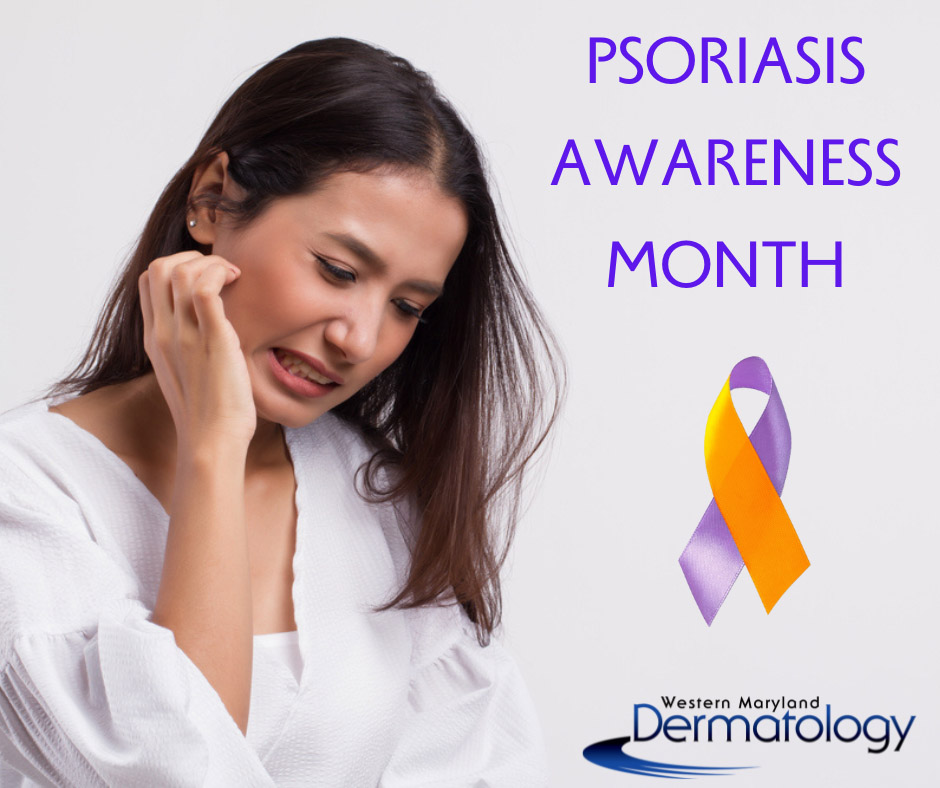Understanding Psoriasis:A Comprehensive Guide for Psoriasis Awareness Month

August is Psoriasis Awareness Month, a time dedicated to educating the public about this chronic skin condition that affects millions worldwide. At Western Maryland Dermatology, we’re committed to raising awareness and providing comprehensive care for those living with psoriasis. Whether you’re newly diagnosed or have been managing psoriasis for years, understanding this condition is key to effective treatment and improving your quality of life.
What is Psoriasis?
Psoriasis is an autoimmune condition that causes the rapid buildup of skin cells, leading to scaling on the skin’s surface. These patches, often red and inflamed, can appear anywhere on the body, though they are most commonly found on the elbows, knees, scalp, and lower back. Psoriasis is not contagious, but it can be uncomfortable and, in some cases, debilitating.
Common Symptoms of Psoriasis
The symptoms of psoriasis can vary from person to person, but they typically include:
– Red patches of skin covered with thick, silvery scales
– Dry, cracked skin that may bleed
– Itching, burning, or soreness in affected areas
For some, psoriasis is a minor irritation, while for others, it can significantly impact daily life, especially when accompanied by psoriatic arthritis.
Types of Psoriasis
There are several types of psoriasis, each with its unique characteristics:
Plaque Psoriasis: The most common form, characterized by raised, red patches covered with a silvery-white buildup of dead skin cells.
Guttate Psoriasis: Often starts in childhood or young adulthood, appearing as small, dot-like lesions.
Inverse Psoriasis: Occurs in body folds such as the armpits, groin, and under the breasts, with smooth, red lesions.
Pustular Psoriasis: Marked by white pustules (blisters of noninfectious pus) surrounded by red skin.
Erythrodermic Psoriasis: A severe form that can cover the entire body with a red, peeling rash that can itch or burn intensely.
Managing Psoriasis: Treatment Options
While there is no cure for psoriasis, several treatment options can help manage symptoms and reduce flare-ups:
Topical Treatments: Creams and ointments applied directly to the skin can reduce inflammation and slow the growth of skin cells.
Phototherapy: Exposure to ultraviolet (UV) light under medical supervision can help reduce symptoms.
Systemic Medications: Oral or injected medications that affect the entire body, used for more severe cases.
Managing psoriasis goes beyond just medical treatments. Here are some tips for everyday care:
Moisturize Regularly: Keeping your skin hydrated can help reduce dryness and scaling.
Avoid Triggers: Stress, smoking, alcohol, and certain medications can trigger flare-ups.
Follow a Healthy Diet: A diet rich in anti-inflammatory foods can help manage symptoms.
Stay Informed: Educate yourself about the latest treatments and research developments.
At Western Maryland Dermatology, we understand the challenges of living with psoriasis. Our team of experienced dermatologists is here to help you navigate your condition with personalized treatment plans and ongoing support. During Psoriasis Awareness Month, we encourage everyone to learn more about this condition, support those affected, and take steps toward better skin health. Need help managing your psoriasis? Contact us today to schedule a consultation and take the first step towards clearer, healthier skin. (301) 777-7900
